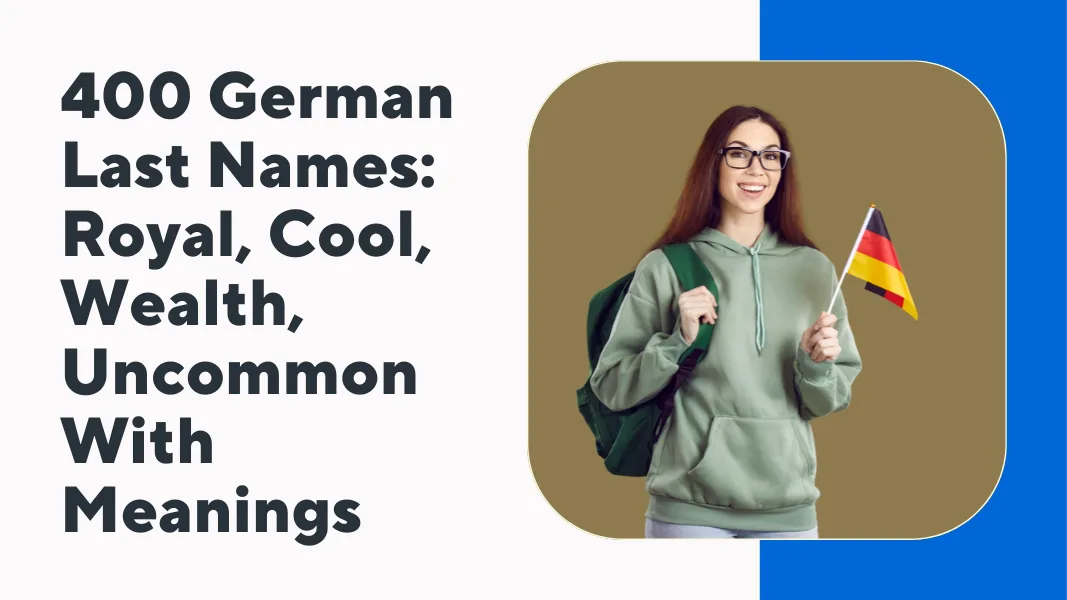400 German Last Names: Royal, Cool, Wealth, Uncommon With Meanings

German last names carry centuries of tradition, culture, and storytelling. Whether they’re tied to professions, geography, or noble families, these surnames add depth and identity. For writers, gamers, or anyone seeking a unique persona, they offer both heritage and character.
This list of German last names is designed to inspire across contexts — from naming characters in novels and RPGs to finding the perfect surname for group chats or creative projects. By diving into cool, royal, and uncommon categories, you’ll discover how each name sparks imagination while remaining rooted in authenticity.
Why German Last Names Can Make or Break the Vibe

A surname can instantly set tone and expectation — bold, mysterious, noble, or playful. With German last names, you get:
- Strong, commanding sounds that leave lasting impressions
- Ties to rich heritage and recognizable European culture
- Versatility for characters, teams, and creative identities
- A balance between history and modern coolness
Cool German Last Names
Cool German last names often sound crisp, stylish, and easy to recall. They strike a balance between tradition and modern appeal, making them perfect for characters and creative uses.
- Keller
- Voss
- Brandt
- Weber
- Schroder
- Kruger
- Stein
- Jager
- Bauer
- Vogel
- Beck
- Urban
- Roth
- Schmidt
- Braun
- Lang
- Graf
- Winter
- Wulf
- Richter
- Herzog
- Reinhardt
- Fuchs
- Meier
- Schultz
- Hartmann
- Kuhn
- Gartner
- Wolf
- Engel
- Schreiber
- Zimmer
- Berg
- Fischer
- Krause
- Albers
- Stahl
- Kirsch
- Busch
- Seidel
- Binder
- Reiter
- Adler
- Pohl
- Hauser
- Schwarz
- Lenz
- Faber
- Kranz
- Lorenz
- Hess
These surnames feel sharp and memorable, with sounds that resonate in gaming, writing, or branding. They capture both tradition and a touch of modern flair.
They’d fit beautifully for online personas, cool characters in novels, or even sports and esports team identities where sleekness and attitude matter.
Royal German Last Names
Royal German last names carry aristocratic weight, often tied to noble houses, dukes, and medieval courts. They exude prestige and timelessness.
- Hohenzollern
- Wettin
- Luxemburg
- Habsburg
- Oldenburg
- Welf
- Salm
- Leuchtenberg
- Isenburg
- Falkenstein
- Lippe
- Hohenberg
- Waldburg
- Erbach
- Sayn
- Reuss
- Schwarzburg
- Anhalt
- Zähringen
- Fürstenberg
- Solms
- Bentheim
- Hohenlohe
- Pappenheim
- Oettingen
- Holstein
- Lauenburg
- Sigmaringen
- Arnsberg
- Bergedorf
- Ravensberg
- Nassau
- Henneberg
- Isenburg-Birstein
- Waldeck
- Katzenelnbogen
- Babenberg
- Ascania
- Weissenfels
- Lippe-Detmold
- Lobkowicz
- Reventlow
- Wied
- Werle
- Frankenberg
- Westphalen
- Plauen
- Greiffenclau
- Sponheim
- Veldenz
Names in this category radiate grandeur and formality. They feel majestic, tying back to dynasties and noble bloodlines of Germany’s past.
They’re ideal for fantasy novels, RPGs, or world-building projects where a sense of nobility and hierarchy adds richness to characters or storylines.
German Last Names That Start With C
German surnames beginning with “C” are less common, but they stand out because of their rarity and distinctive sound.
- Clemens
- Clasen
- Clausen
- Christmann
- Cramer
- Clauer
- Christoph
- Czerny
- Cuno
- Cassel
- Curtius
- Cronenberg
- Carl
- Conrad
- Christner
- Clausing
- Clauß
- Caspari
- Canzler
- Croll
- Clarenbach
- Carius
- Creutz
- Cords
- Clahsen
- Cramerhoff
- Clauberg
- Christlieb
- Czoernig
- Clausinger
- Cremer
- Claußen
- Cornelius
- Clodt
- Cronemeyer
- Czekalla
- Czajka
- Clausinghaus
- Christophori
- Cleff
- Clodwig
- Creutzburg
- Czichon
- Claussen
- Cassirer
- Clarenz
- Czaja
- Clodius
- Czornak
- Czarnetzki
The uniqueness of “C” surnames makes them instantly recognizable. They carry an edge of rarity while still being grounded in German heritage.
Perfect for authors or game designers seeking less predictable names, they add fresh variety to any story, character, or digital identity.
German Last Names and Meanings
Here’s a mix of surnames paired with their origins or meanings, highlighting the storytelling power behind each choice.
- Müller — miller
- Schmidt — smith
- Schneider — tailor
- Fischer — fisherman
- Weber — weaver
- Bauer — farmer
- Koch — cook
- Schröder — cloth cutter
- Schreiber — scribe
- Zimmermann — carpenter
- Jäger — hunter
- Becker — baker
- Maurer — mason
- Metzger — butcher
- Kaiser — emperor
- Graf — count
- Herzog — duke
- Fürst — prince
- Richter — judge
- Kaufmann — merchant
- Sänger — singer
- Pfeiffer — piper
- Wagner — wagon maker
- Kirsch — cherry
- Holzmann — woodman
- Hofmann — steward
- Schuhmacher — shoemaker
- Vogt — bailiff
- Gärtner — gardener
- Krämer — shopkeeper
- Klein — small
- Lang — tall
- Stark — strong
- Fröhlich — cheerful
- Freund — friend
- Glück — luck
- Winter — season name
- Sommer — summer
- Herbst — autumn
- Frühling — spring
- Bergmann — miner
- Waldmann — forest man
- Feldmann — field man
- Bach — stream
- Seemann — sailor
- Schloss — castle
- Adler — eagle
- Wolf — wolf
- Fuchs — fox
This section uncovers the stories behind surnames, tying names to trades, nature, and noble ranks. Their meanings enrich characters and creative projects.
Writers, students, or role-players can use these to give their creations more depth and personality, grounded in cultural authenticity.
Uncommon German Last Names
Rare surnames stand out because they don’t appear often, giving them a mysterious or unique aura.
- Altmann
- Bormann
- Zehnder
- Dellinger
- Kunzmann
- Treiber
- Sperling
- Feucht
- Wust
- Osthoff
- Rosenkranz
- Kreutzer
- Könnecke
- Pfitzner
- Nebel
- Pankratz
- Seifert
- Teufel
- Wagenknecht
- Blumrich
- Heintzmann
- Volkmann
- Troebs
- Ochsner
- Weigel
- Rumpel
- Troschke
- Pfaff
- Schwanitz
- Zobel
- Brockmann
- Kretzschmar
- Loeffler
- Rehbein
- Bogen
- Tannhäuser
- Blaumeiser
- Hirschfeld
- Krätschmer
- Lautenschläger
- Weidenbach
- Geissler
- Trenkmann
- Haberkorn
- Kallweit
- Oppermann
- Schwabe
- Theilhaber
- Weisbrod
- Zirkel
These uncommon surnames feel distinctive, carrying sounds that break away from the predictable. They suggest individuality and rare origins.
They’re perfect for authors, role-players, or anyone who wants their persona, project, or character to stand out with something less mainstream.
Wealthy German Surnames
Some surnames became associated with wealth through nobility, land ownership, or business dynasties.
- Krupp
- Siemens
- Thyssen
- Oppenheim
- Rothschild
- Warburg
- Haniel
- Quandt
- Reemtsma
- Flick
- Sachs
- Hertie
- Daimler
- Porsche
- Benz
- Allianz
- Bayer
- BASF
- Henkel
- Schering
- Merck
- Mannesmann
- Continental
- Zanders
- Springer
- Burda
- Beiersdorf
- Bosch
- Deichmann
- Albrecht
- Otto
- Schwarz
- Adidas
- Puma
- Telefunken
- Hochtief
- Essenwein
- Hornbach
- Kaufhof
- Leica
- Miele
- Ravensburger
- Tengelmann
- Trumpf
- Voith
- Ziegler
- Knorr
- Würth
- Stihl
- Zeiss
- Faber-Castell
These surnames signal affluence, innovation, and historical ties to industry or noble estates. They often symbolize business dynasties.
For business case studies, roleplay involving tycoon characters, or branding projects, these wealthy surnames add a touch of prestige and authority.
German Last Names Male
Some surnames carry masculine weight, often sharp or forceful in sound.
- Krieger
- Schwerdt
- Donner
- Hagen
- Bismarck
- Ritter
- Sturm
- Blitz
- Falk
- Hammer
- Speer
- Held
- Wolfhart
- Eisenberg
- Hauptmann
- Schiller
- Hartwig
- Rau
- Brandner
- Wolfram
- Kraft
- Herzog
- Boehm
- Kreiger
- Adlerstein
- Eberhardt
- Rosenberg
- Weidmann
- Gerhardt
- Wulfert
- Steinhauer
- Reinhard
- Schott
- Tiefenbach
- Eckhart
- Gunther
- Hildebrandt
- Meinhardt
- Behrendt
- Wurthmann
- Dietrich
- Kunz
- Albrecht
- Oswald
- Pankow
- Degenhardt
- Bollmann
- Kaiserfeld
- Rudiger
- Wagenfeld
These names radiate strength and intensity. They resonate as bold, masculine choices tied to warriors, leaders, or commanding presences.
They’d fit excellently in fantasy roleplay, military strategy games, or dramatic storytelling where a forceful presence is essential.
German Last Names Female
Feminine surnames often sound softer, lyrical, or tied to nature and beauty.
- Rosenfeld
- Liebmann
- Himmelreich
- Sonnenberg
- Blumenfeld
- Mondschein
- Edelmann
- Silberstein
- Weiss
- Sternberg
- Engelmann
- Waldstein
- Herzenberg
- Licht
- Goldstein
- Kronenberg
- Rosenthal
- Wunderlich
- Hoffmann
- Perlmann
- Friedenberg
- Schönberg
- Lilienfeld
- Gottlieb
- Seelenfreund
- Morgenstern
- Kirschbaum
- Sommerfeld
- Weidenstein
- Saphir
- Traubenberg
- Winterberg
- Freudenreich
- Silberberg
- Ehrenfeld
- Vogelmann
- Herzlieb
- Schönfeld
- Blumenthal
- Glockenspiel
- Rosenbaum
- Kristall
- Goldreich
- Freudenberg
- Mondfeld
- Rosengarten
- Hellmann
- Edelstein
- Lilienberg
- Silberwald
- Herzfeld
These names carry softness, beauty, and symbolism of light, love, and nature. They often sound poetic while retaining German linguistic strength.
They’re a perfect match for romantic stories, lyrical character naming, or even as aesthetic online personas or usernames.
How to Choose the Best German Last Names
- Look for surnames that reflect the personality or role of your character.
- Shorter names often sound sharper and more modern.
- Longer, compound names add drama and complexity.
- Historical or noble surnames are excellent for fantasy world-building.
- Uncommon names can help a persona stand out online.
- Always check cultural context to keep names respectful and accurate.
Read: Teletubbies Names
Read: Leprechaun Names
Read: Japanese Names
Read: Gang Names for Boys & Girls
Read: Cool Planet Names
FAQs
What makes German surnames unique compared to others?
They often come from occupations, geography, or noble titles, giving them strong historical and cultural roots that stand out globally.
Are German surnames still used in modern Germany?
Yes, many traditional surnames are still common, though spelling variations sometimes occur due to regional differences and modernization.
Can I use German surnames for fictional characters?
Absolutely — they work wonderfully in novels, RPGs, and games, adding authenticity and character depth.
Do German surnames always have meanings?
Most have origins tied to trades, places, or characteristics, though some noble names are linked to family dynasties rather than direct meanings.
What’s the difference between surnames and given names in German culture?
Surnames typically indicate family heritage, while given names are personal and often follow traditional or modern trends.
Conclusion
German last names hold immense cultural weight, whether tied to professions, noble dynasties, or nature. They can transform a project, character, or identity by infusing history and meaning. By choosing carefully, you’ll unlock names that are stylish, authentic, and memorable. Whether for stories, games, or creative branding, exploring German last names opens countless possibilities.






